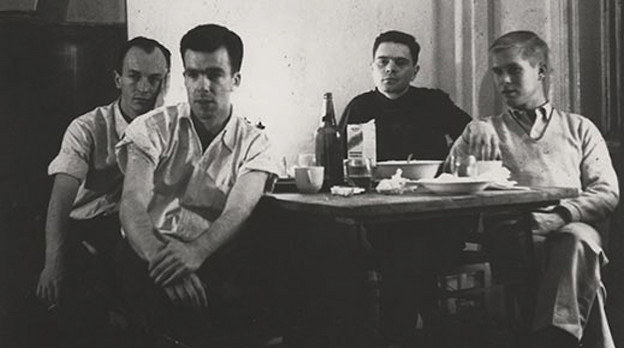from Schuyler entries

7/7/88
An emergency, reading that James Schuyler “was born in 1933” — so says the jacket note on The Crystal Lithium. That would make him a mere six years older than I, seven years younger than Frank O'Hara, one year older than Ted Berrigan, and so on — a fact behind his accomplishment which my vanity calls unacceptable. But the jacket for Hymn to Life says, “born in 1923.” So there. (Though where vanity rears its horny head there can be no real relief).
***
The city poet who knows, like no other, the names of all flowers. Of whom else can it be said, he is our best (or only) descriptive poet? Was this ever said, as it might have been, of John Clare? “You can’t get at a sunset naming colors.” Every poem, a view. The sense in each of a scrim of exact detail so carefully woven as to be seamless, impregnable to the monsters raging, ready to pounce or tear through from the other side. The central character, if any, of most of his poems is the day, the poem geared to get it down, nail it in its lineaments as it appears and goes: “a nothing day,” “day the color of a head cold,” “Dark day,” “a day subtle and suppressed,” “May 24th or so,” “a day like any other,” and so on. His writing has what filmmakers call “room tone,” c.f., Charles North’s remark about Schuyler’s perfect pitch.
***
One hot day in 1961, when I was working in the office at ARTnews, Tom Hess said, “Go down to Jimmy Schuyler’s and pick up his reviews.” I hardly knew Jimmy then, but I had heard from John Myers that he had been having psychiatric troubles. The reviews for that month were long overdue; Jimmy apparently had told Tom that he had them but in his present mental disarray couldn’t manage the trip uptown from his place on lower Broadway to deliver them. Once there, I rang the bell a few times and got no response. Baffled as to what to do next, I went to a corner phone booth and called Frank who suggested I try Jimmy’s number. That worked, and Jimmy buzzed me in. The apartment was a mess, Jimmy in pajamas sort of silently, aimlessly padding around the front room. No, he said firmly, giving me a somewhat stony look, there were no reviews. I left, feeling useless and rude, an intruder in someone else’s private soul dust.
Schuyler told an interviewer that, to engage his interest, he sometimes wrote the first drafts of his art reviews in verse lines, then later rearranged them, closed up and slightly altered, in paragraphs. According to Frank O’Hara, the 1950s ARTnews poets Barbara Guest, John Ashbery and O’Hara himself, used to show their monthly short reviews and longer articles to Jimmy for style checks. Frank said, “Jimmy was the real writer; he knew where the commas were supposed to go.”
***
Cy Twombly [Stable; through January], fleeing for his creative life from the white hell of Black Mountain, shows Siberian slabs (those diamonds they’ve found there, what makes them so sure they’re not just frozen tears?). Fabulously underpriced. J.S. [1957]
***
Schuylerism
The prose is golden, in the same sense as Jane Freilicher’s great painting Goldenrod Variations: the prodigious scope alive to, never stumped by, whatever vibrant detail is there, and the sense, too, that all this happens in time and constitutes, in its way, history, human and otherwise. Such accurately directed empathy taken to its eternal edge. About the hornet in the room in “Buried at Springs”: “One of us will have to go.” Or how incomparably, as if Francis Ponge were taking a refresher course in how real both things and the words for them can get, “Trembling, milk is coming into its own.” The under-appreciated (although now in reprint via NYRB) novel What’s for Dinner? does just what Henry Green ordered, “Ring tears from the stone.” The poetry follows suit, even increasingly edgier:
So many lousy poets
So few good ones
What’s the problem?
No innate love of
Words, no sense of
How the thing said
Is in the words, how
The words are themselves
The thing said: love,
Mistake, promise, auto
Crack-up, color, petal,
The color in the petal
Is merely light
And that’s refraction:
A word, that’s the poem.
A blackish-red nasturtium …

No comments:
Post a Comment